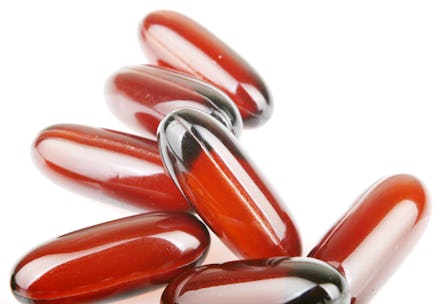New research shows a surprising link between coronavirus and vitamin D

This pandemic has put many of us through all seven stages of grief this year. We’ve traveled from the initial shock all the way back in spring to our acceptance of the new normal, which unfortunately means a lot of canceled summer trips. It’s pretty depressing, literally, that we have gotten less sun this year, since sunlight triggers our bodies to produce vitamin D, and new research suggests that a vitamin D deficiency makes it harder to fight COVID-19.
In a small but revelatory new study, scientists found that over 80 percent of 200 participants with coronavirus had a vitamin D deficiency. The research, which was published today in the Journal of Clinical Endocrinology & Metabolism, suggests that a lack of vitamin D compromises our immune system in a way that makes fighting the disease especially difficult. The research also found that a higher percentage of men have this deficiency than women, which is a finding that aligns with how COVID-19 has been affecting more men as well.
But it’s not just that people who lack sufficient vitamin D may have a harder time fighting off the virus if they catch it, according to the study’s findings. People who have a vitamin D deficiency may also be more likely to contract COVID-19. These findings, though preliminary, could also mean that coronavirus hampers the absorption of vitamin D.
While the scientists only studied 200 patients — a very small group, relatively speaking — the link they suggest between vitamin D deficiency and compromised immune function is backed up by other research. NIH, home of the incredible Dr. Fauci, published a study in 2012 investigating — and confirming — the crucial role of vitamin D and its effects on calcium, bone health and growth, and the immune system.
If you’re wondering how many of us need a little more vitamin D in our lives, well, a lot of us. A whopping 42% of Americans have a deficiency in Vitamin D, and that figure includes pre-menopausal women, people of color, and the elderly, some other folks who may be at risk for more severe cases of COVID-19.
Furthermore, the rate of vitamin D deficiency for Black Americans might be as high as 76%. (The Black person who is sharing this information with you currently, will be right back — he's gone to get a glass of real milk.) We all know how the coronavirus is ravaging our community and other communities of color, so making sure we defend our bodies in any way possible is especially important as winter approaches.
Just because the sun will be out less as we enter winter doesn’t mean that you can’t get more vitamin D. You can up your intake in quite a few ways, depending on you lifestyle. You can get a sun lamp, eat foods rich in vitamin D — like egg yolks, cheese, fish, and beef liver (which I’m sure you have in your fridge right now), or you could go the supplement route. Just make sure to check in with your doctor about dosage, because too much vitamin D can actually negate its benefits in your body. Six hundred to 800 IU is generally recommended for the general population.
We’re now in month 785,228 of the coronavirus pandemic, approximately, and for most of America, the weather is cooling. But you don’t have to use that as an excuse to stay indoors. Or maybe I'll just take a step outside, because even a little bit of sun can help up your levels of vitamin D and balance your circadian rhythms. We all want to be healthy and happy as we leave this a horrid year and the pandemic behind. So, either through supplements, lamps, a glass of milk, or just going outside — a little extra vitamin D couldn’t hurt.